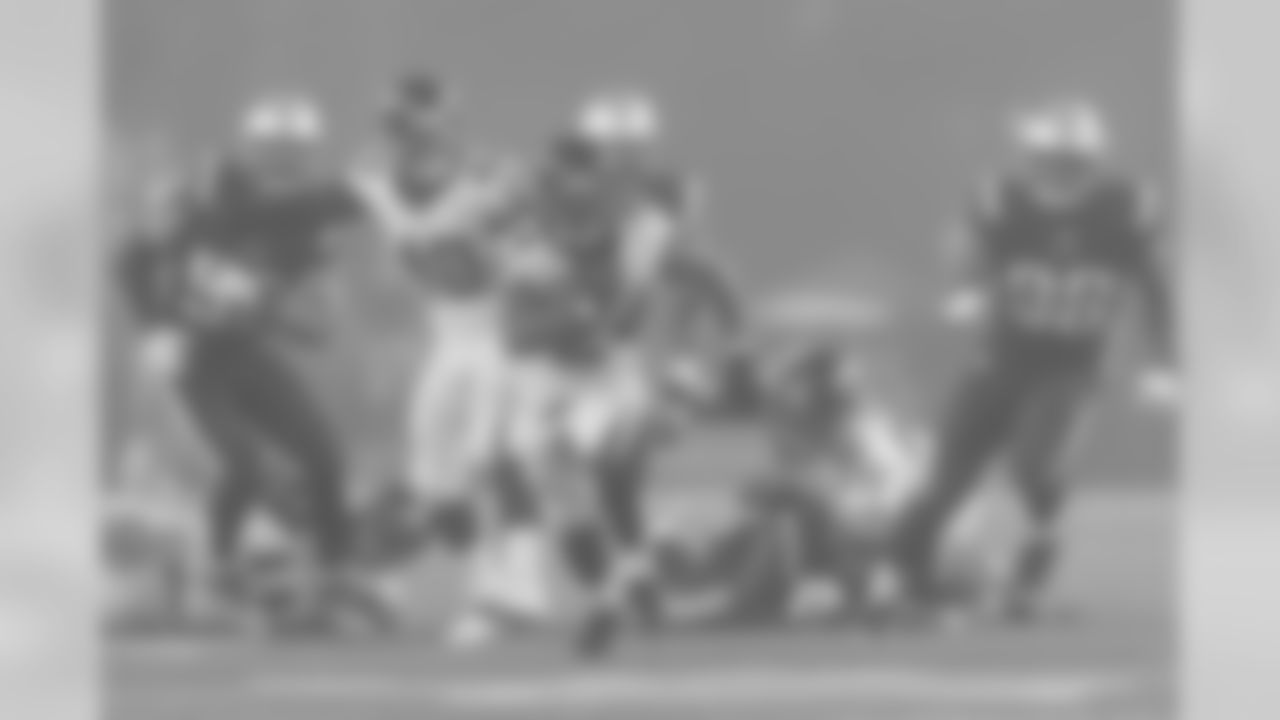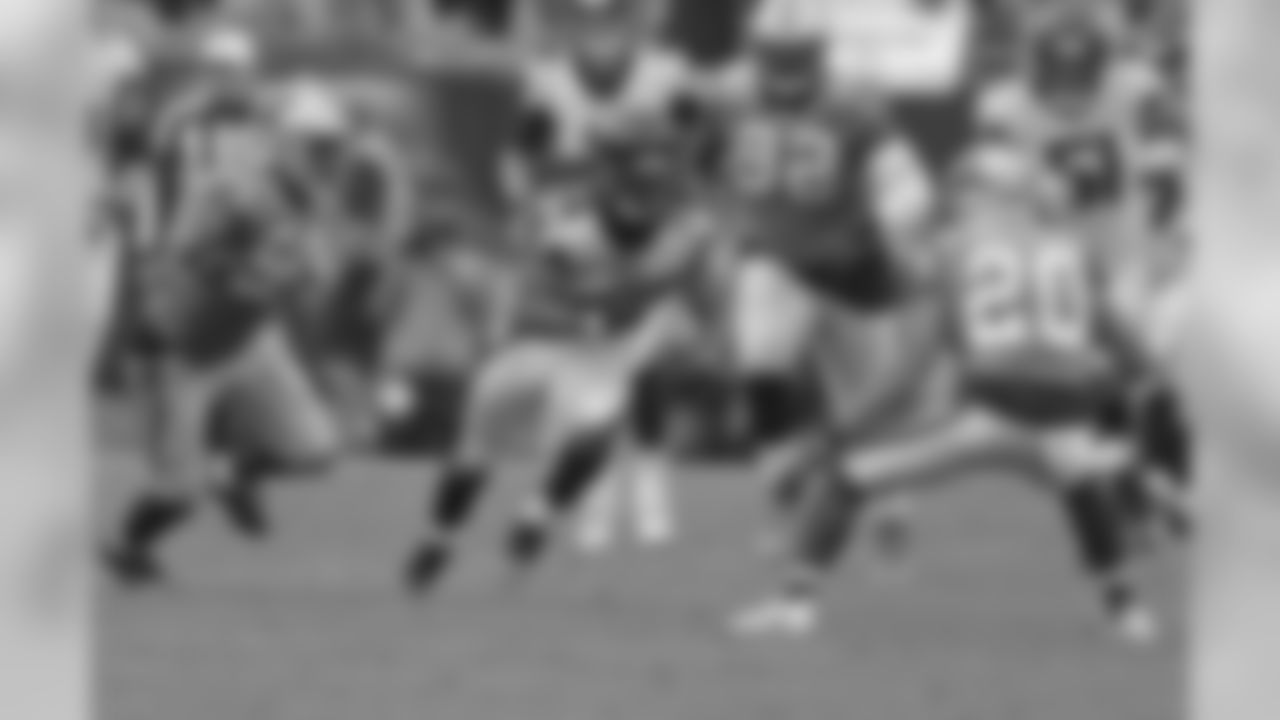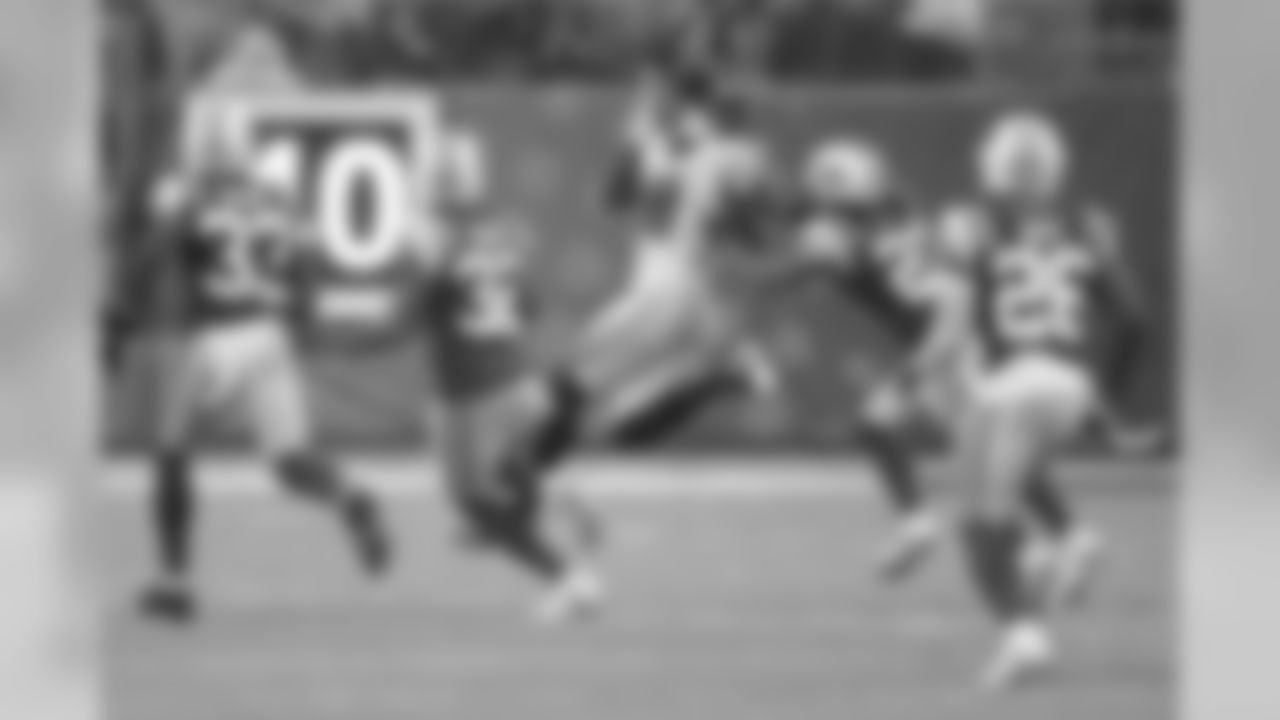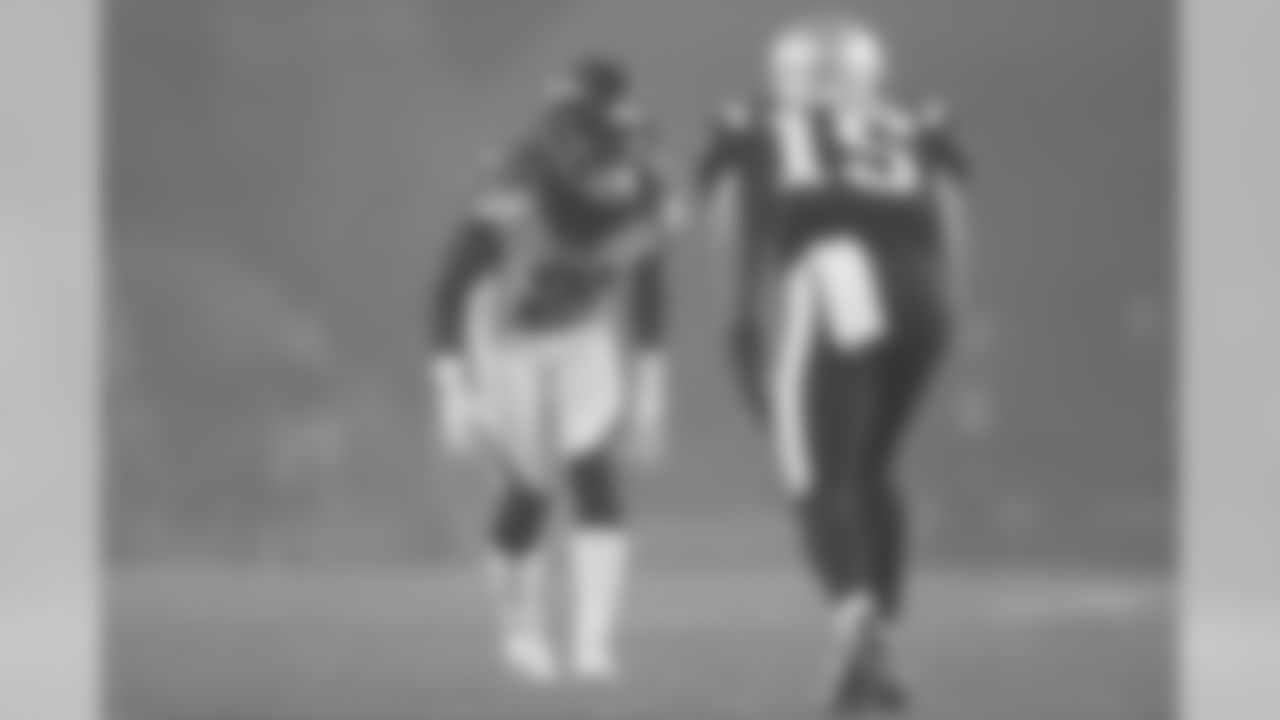Pictures of some of the Falcons' top players.

RB Devonta Freeman

RB Devonta Freeman

RB Devonta Freeman

WR Julio Jones

WR Julio Jones

WR Julio Jones

LB Vic Beasley

LB Vic Beasley

LB Vic Beasley

S Keanu Neal

S Keanu Neal

S Keanu Neal

QB Matt Ryan

QB Matt Ryan

QB Matt Ryan

CB Desmond Trufant

CB Desmond Trufant

CB Desmond Trufant

DE Adrian Clayborn

DE Adrian Clayborn

DE Adrian Clayborn

DT Grady Jarrett

DT Grady Jarrett

DT Grady Jarrett

RB Tevin Coleman

RB Tevin Coleman

RB Tevin Coleman

WR Mohamed Sanu

WR Mohamed Sanu

WR Mohamed Sanu
The "I-75 Trophy" is once again up for grabs.
That completely fictitious prize, which was just named 10 seconds ago, belongs to whichever team has the upper hand in the long-running and oft-emotional Tampa Bay Buccaneers-Atlanta Falcons head-to-head series. Until Sunday, that's neither team.
Atlanta knotted that series three weeks ago with a hard-fought 34-20 win over the Buccaneers in their new home, Mercedes-Benz Stadium, making the all-time ledger 24-24. That marks the 12th time that the series has been tied, and neither team has held more than a two-game edge since the beginning of the 2010 season.
The Buccaneers and Falcons have been playing each other since 1977 and meeting twice a year since 2002, but the series advantage has very rarely swung heavily in either direction. The Bucs did manage to open up a six-game edge in 2008, but Atlanta promptly won five in a row to close it back up. The Falcons have never been more than two games up in the series, and that last occurred in 1995.
Now the Falcons are coming back to Tampa for the 26th time, though they will surely fly rather than taking the direct I-75 run directly from Atlanta to the Bucs' hometown. Barring a tie, they will either leave with the traveling trophy in their possession or allow it to find a home at Raymond James Stadium for at least another nine months.
Atlanta's victory in Week 12 was typical of the recent history between the two teams, with no lack of scoring. The eight Bucs-Falcons games prior to that one had seen an average of 56 combined points per matchup; that one had 54. And while Atlanta won it by two touchdowns, it was still hotly-contested, as the visitors rallied from a 27-6 deficit with a pair of Peyton Barber touchdown runs in the second half. After Barber's second score pulled the Bucs within seven, Kendell Beckwith forced a fumble by Falcons running back Terron Ward and Brent Grimes picked it up and ran it back almost to midfield. From there, the Bucs moved into the red zone but faced a fourth-and-one at the Atlanta 18. Tampa Bay went for it and Atlanta broke up a pass intended for Cam Brate inside the five-yard line. The Falcons then added a late insurance touchdown on a 14-yard Tevin Coleman run. The Bucs fell into such a deep hole early in the game because they could figure out no way to stop wide receiver Julio Jones, who finished with 12 catches for 253 yards and two touchdowns.
Before test-driving the new Mercedes-Benz Stadium, the Buccaneers won their last game in the Falcons' former home, the Georgia Dome, which was also the 2016 season opener. That led to a split in the season series thanks to the Falcons 43-28 prime-time win on Thursday night later in the season. That kept the Buccaneers from pulling off consecutive division sweeps of the Falcons. Atlanta, of course, went on to represent the NFC in the Super Bowl at the end of that campaign.
The Bucs' Georgia Dome farewell was an exciting affair in which the Buccaneers got up by 31-13 but had to stave off a furious Falcons rally. Quarterback Jameis Winston threw deep with great success that day, rallying the Bucs to 21 unanswered points with touchdown passes of 23 yards to Charles Sims, 30 yards to Austin Seferian-Jenkins and 45 yard to Mike Evans. Those were part of a 281-yard, four-TD effort that earned Jameis Winston NFC Offensive Player of the Week honors. Falcons QB Matt Ryan responded by hitting Julio Jones on a 25-yard touchdown pass, then directed a field goal drive to close the gap to 31-24. However, the Bucs ran a successful four-minute drill to drain all but 1:52 off the clock and Gerald McCoy tipped away Ryan's fourth-down pass to end Atlanta's last threat.
The Bucs' sweep in 2015 included a 23-20 overtime thriller in Atlanta in Week Eight, won by the Buccaneers on Connor Barth's 31-yard field goal almost 10 minutes into the extra period. Winston had staked the visitors to a 20-3 lead in the third quarter with a touchdown pass to Brate and his own four-yard scoring run, but the Falcons mounted a stunning rally. Tampa Bay's defense stuffed a third-and-one run by Devonta Freeman at the Bucs' three-yard line with five minutes left, forcing a field goal and preserving a seven-point lead. However, the Falcon defense one-upped that great play by holding on third-and-one and fourth-in-one at the Bucs' 40 on the ensuing drive. That set up a game-tying touchdown drive that Ryan finished with an eight-yard pass to Jones. The Bucs got the ball first in overtime and put together an impressive drive but stalled at the seven, settling for Barth's field goal. The Falcons had a shot to win it with a touchdown but a key sack by DE Howard Jones helped snuff the final drive near midfield.
The Bucs completed the 2015 sweep at Raymond James Stadium in Week 13, this time on the strength of a dramatic late-game rally. Trailing 19-16, the home team got the ball across midfield with three minutes to play but faced a third-and-19 from the Atlanta 43. Winston saved the day with the signature play of his outstanding rookie season, a 20-yard scramble on which he appeared to be stopped short before popping up off the pile and fighting past the marker. Four plays later he hit Evans on a six-yard touchdown pass to put the Bucs up, 23-16, and LB Lavonte David intercepted Ryan's next pass to seal the victory.
That sweep countered one by the Falcons in 2014, which had marked the first time since 2010 that the two teams did not split. Jones caught two TD passes and WR Devin Hester scored on both a 20-yard end-around and a 62-yard punt return in a 56-14 blowout for Atlanta in the Georgia Dome, the highest-scoring game in the entire series. The rematch in Tampa in November was far more competitive, with the Buccaneers taking a 17-16 lead in the fourth quarter on an Austin-Seferian-Jenkins touchdown catch. However, an illegal-contact call on CB Johnthan Banks on a third-down incompletion set up a Roddy White touchdown catch on the next drive and Atlanta scored the final 11 points in the game to win by 10.
Before the Bucs win in Week Eight, Tampa Bay's last victory in Atlanta came in the 2012 regular-season finale – against a 13-2 Falcons team that did not rest its starters despite having the NFC's first-overall playoff seed locked down. That was viewed as a boost for the Buccaneers heading into 2013. However, the Bucs lost their first eight en route to a 4-12 finish that prompted the hiring of a new coaching staff and a new general manager. The Falcons also struggled to a 4-12 finish in 2013, thanks in large part to a rash of injuries.
The two teams first met late in 1977, when the Buccaneers were still in the midst of the franchise-opening 26-game losing streak that spanned most of their first two seasons. Atlanta won, 17-0, but the Buccaneers would get their first victory in New Orleans in two weeks later and close out with two in a row. Early in 1978, Tampa Bay was clearly turning a corner, and a Week Four meeting at Tampa Stadium produced a 14-9 Bucs victory, just the team's second ever win at home.
The Bucs were 7-2 and on their way to their first playoff berth a year later when the Falcons, who would finish just 6-10, pulled of a 17-14 upset. Contrastingly, in 1981, the Bucs made the playoffs for a second time by winning four of their last five to finish 9-76, and the closest decision in that string was a 24-23 home win over Atlanta. The Falcons led by six in the fourth quarter before Doug Williams hit Kevin House for a 71-yard go-ahead touchdown, and the win was sealed when Atlanta kicker Mick Luckhurst missed a 45-yard field goal with four seconds to play. "We just got beat today by a football team that out-executed us," said Atlanta Head Coach Leeman Bennett after the game. "I can't say anything but good things about the Tampa Bay Buccaneers. They are a fine football team. They executed when they had to and scored when they had to. I can't do anything but heap praise on them and their staff."
Five years later, Bennett would be head coach of the Buccaneers, as he replaced the retired John McKay in 1985. The Bucs won just four of 32 games during Bennett's tenure, and a 23-20 loss to the Falcons in September of 1986 was the first of two straight defeats in overtime, the only time that has happened in franchise history. Not surprisingly, the Bucs had a new coach, Ray Perkins, in place to start the 1987 season and the very first thing his team did was demolish the Falcons on opening day, 48-10. QB Steve DeBerg, in his first of two stints with Tampa Bay (he would also later suit up briefly for the Falcons), threw five touchdown passes in that contest, a Buc record that would later be tied (by Brad Johnson, Josh Freeman and Jameis Winston earlier this year) but never surpassed. Coincidentally, Atlanta was also the victim in the Buccaneers' last win under Perkins, late in the 1990 season. The Bucs won that game, 23-17, on a 35-yard touchdown pass from Vinny Testaverde to Mark Carrier with 39 seconds left, but it wasn't enough to save Perkins' job as the team used a late bye week to replace him with Richard Williamson.
If there were hurt feelings by those two Buccaneer wins under Perkins, they escalated in the early '90s when both teams brought in colorful head coaches, Jerry Glanville in Atlanta and Sam Wyche in Tampa Bay. Glanville and Wyche had already crossed paths for years in the old AFC Central, with Glanville piloting the Houston Oilers and Wyche at the helm of the Cincinnati Bengals, and there was apparently no love lost between the two. Wyche's Bengals running up the score in a 61-7 win over Glanville's Oilers in 1989 may have had something to do with that. Glanville's Falcons drubbed Williamson's Buccaneers, 43-7, in 1991, and then poured it on again the next year in a 35-7 victory in Tampa. That was Wyche's first year as head coach in Tampa, and during the offseason he had cut linebacker Jesse Solomon, who took the move personally. Solomon ended up with the Falcons and Glanville fanned the flames of the rivalry by letting Solomon play on offense late in the blowout, even giving him two handoffs that he turned into 12 yards.
Deion Sanders also played on offense late in that game as another dig at Wyche by Glanville, but when the teams met again the next year, Sanders was prominently featured for a different reason. The Hall of Fame-bound cornerback was surprisingly beaten for two long touchdowns by Bucs WR Horace Copeland, keying a 31-24 Tampa Bay win. The Buccaneers' rise in the second half of the 1990s was not matched by a renaissance in Atlanta, which led to Tampa Bay handily winning the last three matchups before the two teams became fellow NFC South denizens in 2002.
After the South was formed, the Falcons and Bucs evenly split the next 24 meetings before last year's Atlanta sweep. The Bucs swept in 2002, 2005 and 2007, each time helping propel Tampa Bay to division titles. Atlanta swept in 2006, 2009 and 2010, though only that final year was followed by a Falcons division title.
From the Bucs' perspective, the best games in the series since the creation of the NFC South occurred in 2002, 2005, 2012 and last year, as described above. In '02, the Buccaneers were on their way to their first Super Bowl title, but they had a high-profile December matchup with the streaking Falcons and their new star quarterback, Michael Vick. The Bucs' defense completely stifled Vick in that game, especially on the ground, and won 34-10 to essentially wrap up the division title. In '05, the Bucs were on the verge of following out of division title contention – and maybe the playoffs altogether – when they went to overtime against the Falcons at Raymond James Stadium in Week 16. A fumble on the opening kickoff in the extra period set Atlanta up for a chip shot field goal to win it but DE Dewayne White blocked the kick and the Bucs eventually won with their own field goal, 27-24, at the very end of overtime. In 2012, the Buccaneers stumbled into the Georgia Dome in Week 17, having lost five in a row after that 6-4 start, but finished strong with a 22-17 win over the division champs.
Bucs-Falcons Game-by-Game Record:
| 1977 | L, 17-0 | Tampa |
| 1978 | W, 14-9 | Tampa |
| 1979 | L, 17-14 | Atlanta |
| 1981 | W, 24-23 | Tampa |
| 1984 | W, 23-6 | Tampa |
| 1986 | L, 23-20 (OT) | Tampa |
| 1987 | W, 48-10 | Tampa |
| 1988 | L, 17-10 | Atlanta |
| 1990 | W, 23-17 | Tampa |
| 1991 | L, 43-7 | Atlanta |
| 1992 | L, 35-7 | Tampa |
| 1993 | W, 31-24 | Atlanta |
| 1994 | L, 34-13 | Atlanta |
| 1995 | L, 24-21 | Tampa |
| 1997 | W, 31-10 | Atlanta |
| 1999 | W, 19-10 | Tampa |
| 2000 | W, 27-14 | Atlanta |
| 2002 | W, 20-6 | Atlanta |
| 2002 | W, 34-10 | Tampa |
| 2003 | W, 31-10 | Atlanta |
| 2003 | L, 30-28 | Tampa |
| 2004 | L, 24-14 | Atlanta |
| 2004 | W, 27-0 | Tampa |
| 2005 | W, 30-27 | Atlanta |
| 2005 | W, 27-24 (OT) | Tampa |
| 2006 | L, 14-3 | Atlanta |
| 2006 | L, 17-6 | Tampa |
| 2007 | W, 31-7 | Atlanta |
| 2007 | W, 37-3 | Tampa |
| 2008 | W, 24-9 | Tampa |
| 2008 | L, 13-10 (OT) | Atlanta |
| 2009 | L, 20-17 | Atlanta |
| 2009 | L, 20-10 | Tampa |
| 2010 | L, 27-21 | Atlanta |
| 2010 | L, 28-24 | Tampa |
| 2011 | W, 16-13 | Tampa |
| 2011 | L, 45-24 | Atlanta |
| 2012 | L, 24-23 | Tampa |
| 2012 | W, 22-17 | Atlanta |
| 2013 | L, 31-23 | Atlanta |
| 2013 | W, 41-28 | Tampa |
| 2014 | L, 56-14 | Atlanta |
| 2014 | L, 27-17 | Tampa |
| 2015 | W, 23-20 (OT) | Atlanta |
| 2015 | W, 23-19 | Tampa |
| 2016 | W, 31-24 | Atlanta |
| 2016 | L, 43-28 | Tampa |
| 2017 | L, 34-20 | Atlanta |
Series Notes:
- Overall Series: Tied, 24-24
- Bucs' Home Record: 14-11
- Bucs' Road Record: 10-13
- Current Streak: Lose 2 (2016-17)
- Buccaneers' Longest Winning Streak: 6 (1997-2003)
- Falcons' Longest Winning Streak: 5 (2008-10)
- Regular Season Point Total: Buccaneers 1,031, Falcons 1,003
- Most Points in a Game, Tampa Bay: Buccaneers 48-10 (1987)
- Most Points in a Game, Atlanta: Falcons 56-14 (2014)
- Most Points, both teams: 71, Falcons 43-28 (2016)
- Fewest Points in a Game, Buccaneers: Falcons 17-0 (1977)
- Fewest Points in a Game, Falcons: Buccaneers 27-0 (2004)
- Fewest Points in a Game, both teams: 17, Falcons 14-3 (2006)
* *





















